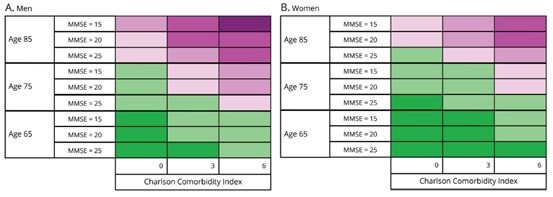19 December 2019
The tool can be used for people with dementia who are diagnosed in primary care and in memory clinics. It can support physicians in discussing the sensitive topic of life expectancy with the patient and their family. Such a conversation can help in adequately planning the required care. Marcel Olde Rikkert, geriatrician in the Radboudumc and involved with the research: “This research provides new insight into the average life expectancy of patients with dementia as it brings different factors together. The tool demonstrates that there is a large variety of dementia and secondary diseases and consequently of prognoses. This means that the provision of personalized care remains of vital importance.
The tool combines age with other diseases
The below table outlines how the tool works. The Mini-Mental State Examination (MMSE) is a short questionnaire that is used when memory issues or dementia are suspected. The test provides an overview of someone’s cognitive skills. The Charlson Comorbidity Index shows how many other diseases a patient has. Dark green indicates a high 3-year survival rate, while dark purple indicates a low survival rate.

These tables illustrate the 3-year survival rate for people who are diagnosed with dementia in primary care (for instance by the GP). Dark green indicates a high survival rate, while dark purple indicates a low survival rate.
Swedish Dementia Register
The researchers, including Haaksma of Radboudumc, looked at the data of over 50,000 patients over the age of 65 for this research. These patients were registered in the Swedish Dementia Register “SveDem”, and were tracked between 2007 and 2015. This means that the tools are most applicable to Swedish healthcare. To use the tool in other countries, it must be tested whether it is also valid there. The relationship between mortality and gender, age, cognitive status, and other diseases has been repeatedly demonstrated, so it can be assumed that similar models can be used in other western European countries.
Different life expectancy for different types of dementia
In the Netherlands, about a quarter of a million people have some form of dementia. There is no cure for this disease at the moment. However, there are many types of dementia, and they develop differently in different individuals. Some can live with their disease for many years, while others have a type of dementia that progresses quicker. Epidemiologist Miriam Haaksma: “To allow for an adequate planning of healthcare, it is important to take the life expectancy of the patient into account. Previous research has shown that uncertainty about the progression of the disease can be a barrier for planning the required healthcare. To decrease this uncertainty for people with dementia, their relatives, and caregivers, we have visualized the survival rate in two graphic tables based on a number of easy to measure factors.

The tool can be used for people with dementia who are diagnosed in primary care and in memory clinics. It can support physicians in discussing the sensitive topic of life expectancy with the patient and their family. Such a conversation can help in adequately planning the required care. Marcel Olde Rikkert, geriatrician in the Radboudumc and involved with the research: “This research provides new insight into the average life expectancy of patients with dementia as it brings different factors together. The tool demonstrates that there is a large variety of dementia and secondary diseases and consequently of prognoses. This means that the provision of personalized care remains of vital importance.
The tool combines age with other diseases
The below table outlines how the tool works. The Mini-Mental State Examination (MMSE) is a short questionnaire that is used when memory issues or dementia are suspected. The test provides an overview of someone’s cognitive skills. The Charlson Comorbidity Index shows how many other diseases a patient has. Dark green indicates a high 3-year survival rate, while dark purple indicates a low survival rate.
These tables illustrate the 3-year survival rate for people who are diagnosed with dementia in primary care (for instance by the GP). Dark green indicates a high survival rate, while dark purple indicates a low survival rate.
Swedish Dementia Register
The researchers, including Haaksma of Radboudumc, looked at the data of over 50,000 patients over the age of 65 for this research. These patients were registered in the Swedish Dementia Register “SveDem”, and were tracked between 2007 and 2015. This means that the tools are most applicable to Swedish healthcare. To use the tool in other countries, it must be tested whether it is also valid there. The relationship between mortality and gender, age, cognitive status, and other diseases has been repeatedly demonstrated, so it can be assumed that similar models can be used in other western European countries.
Different life expectancy for different types of dementia
In the Netherlands, about a quarter of a million people have some form of dementia. There is no cure for this disease at the moment. However, there are many types of dementia, and they develop differently in different individuals. Some can live with their disease for many years, while others have a type of dementia that progresses quicker. Epidemiologist Miriam Haaksma: “To allow for an adequate planning of healthcare, it is important to take the life expectancy of the patient into account. Previous research has shown that uncertainty about the progression of the disease can be a barrier for planning the required healthcare. To decrease this uncertainty for people with dementia, their relatives, and caregivers, we have visualized the survival rate in two graphic tables based on a number of easy to measure factors.
Related news items

Palliative care for people with Parkinson’s Disease and their family Caregivers Current state of affairs
7 October 2021 Advanced stage Parkinson’s disease can cause a variety of symptoms, for which palliative care can be beneficial, though research from the point of view of patients in later stages is still rare. Radboudumc researchers therefore placed their patients perspectives at the center of their recent study. go to page
Radboudumc to lead research team into tackling future pandemics NWO funds complexity research on pandemics
5 August 2021 The Radboudumc is going to lead a study on how to deal with future pandemics, together with Radboud University and the University of Amsterdam. Rick Quax from the Informatics Institute/IAS is involved in this project. go to page
Miniaturized microfluidic platform for automated epigenetic profiling
6 May 2021 Together with Fluidigm, a US-based company focusing on microfluidics, the team of Hendrik Marks publishes in Genome Research the development of a powerful plug and play ChIP-seq platform for minute amount of cells, such as embryonic specimens or small biopsies. go to page
Grants for science communication at Radboudumc
22 April 2021 Scientists at the Radboudumc have received two KNAW grants, each worth 10,000 euros, for science communication. With the new fund, KNAW underlines importance of making science accessible. go to page
